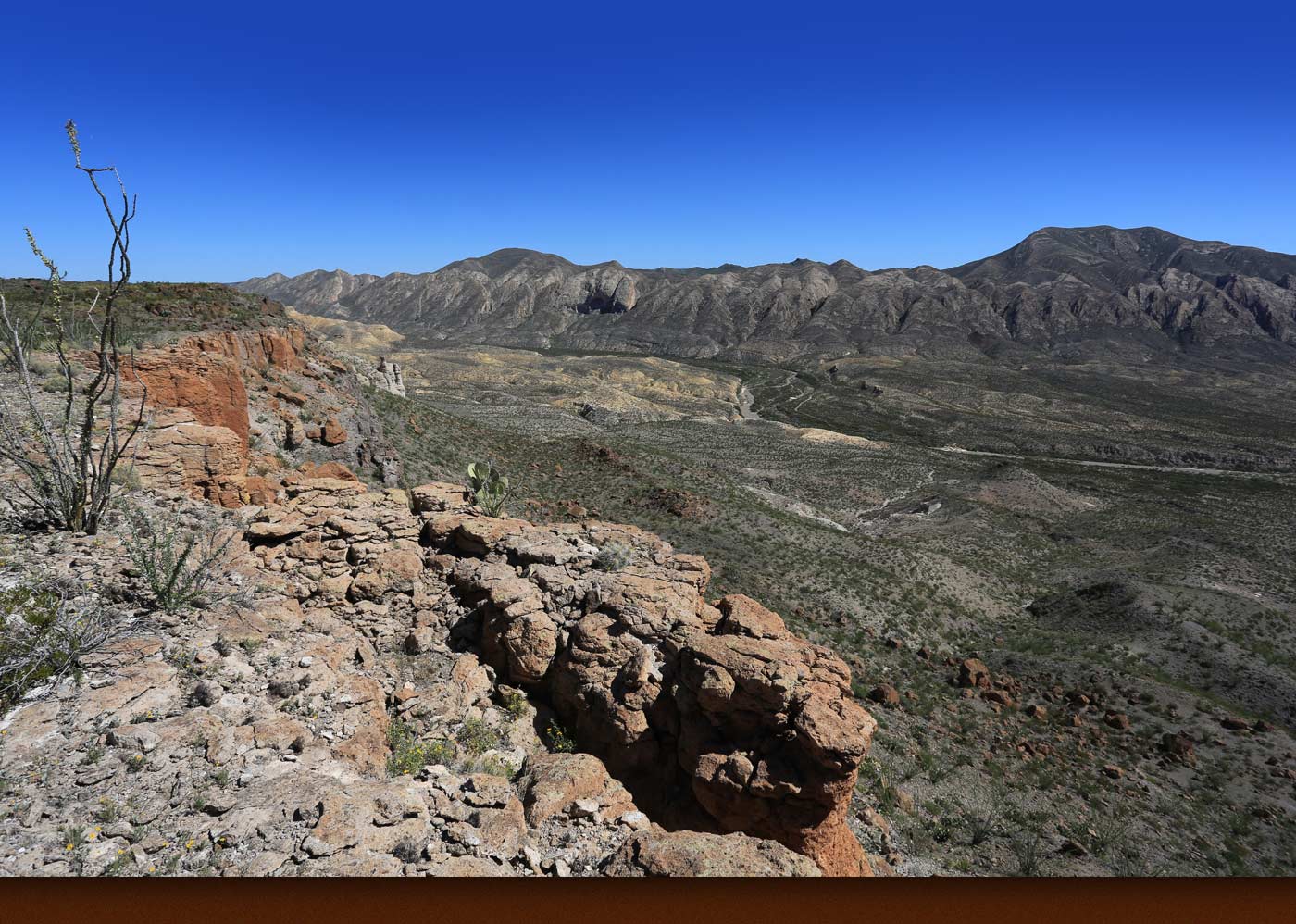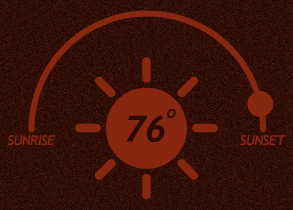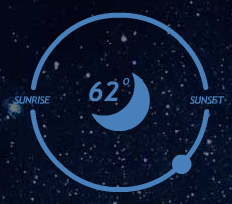
After more than a decade of trips, Cathy Frye and Rick McFarland expected peace and quiet from the Big Bend region of southwest Texas. Then they got lost.

Arkansas Democrat-Gazette/RICK McFARLAND
Rick took this photo at the rim on the first morning of the couple's hike. The rim looks across Fresno Canyon in Big Bend Ranch State Park.

IG BEND RANCH STATE PARK, Texas — Crouched on trembling legs beside a stubby mesquite tree, I tried to steady my voice.
"You have to leave me," I told Rick. "You have to go."
I felt a surge of relief. Finally, I'd said the words aloud.
Rick recoiled. But I knew from the expression that flickered across his face that he'd been thinking the same thing.
"But I don't want to leave you," he protested.
"We don't have any other choice," I replied. "Nobody's looking for us. Nobody even knows where we are."
For 2 1/2 days now, I had trudged behind Rick through the dense cactus under a searing sun. Only fear of being left alone in the vast Chihuahuan Desert had kept me going. But my weakening legs would no longer carry me. For the past five hours, Rick had pulled me up countless rocky hills. Each time we stopped to rest, he had to help me to my feet.
This time, I wouldn't let him. "I can't go any farther," I said, rejecting his outstretched hand. "I'm just holding you back."
For years, even before we first met, Rick and I had been enamoured of the Chihuahuan Desert. To us, this place offered solitude and peace.
But on this trip, the desert was trying to kill us.
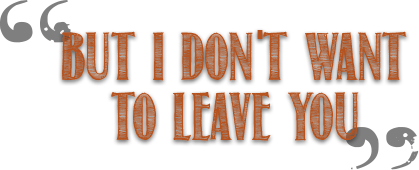




y love affair with this remote region of southwest Texas began in 1996, during my time as a newspaper reporter at the Odessa American.
The Big Bend — named for a sharp turn in the Rio Grande River — was part of my coverage area. I loved the silence, the night sky so dark and clear, the constant surprise of finding small, brilliant blooms scattered along the desert floor.
There are two parks in the area: Big Bend National Park and Big Bend Ranch State Park, known as “The Other Side of Nowhere.” But I had only ever visited the national park.
Rick, a photographer for the Arkansas Democrat-Gazette and my spouse of 13 years, loves the area as much as I do. He often visited the national park when he worked for Texas newspapers.
We were married on April 29, 2001, on the Window View Trail at Big Bend National Park. We return each autumn, just the two of us.
But, as we left on Sunday, Sept. 29 for our 2013 trip, the possibility of a federal government shutdown left us fretting over what we would do if the park closed.
We arrived on Monday, set up camp and hiked.
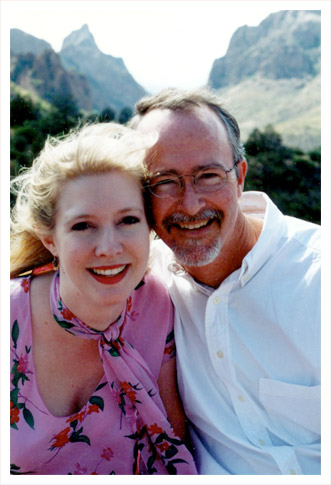
Special to the Arkansas Democrat-Gazette / JIM FRYE
Rick McFarland and Cathy Frye were married on the Window View Trail in Big Bend National Park on April 29, 2001. After the wedding, the couple spent a week camping and hiking in the park.


hat evening we grilled steaks, drank wine from Solo cups
and stayed up late to gaze at the Milky Way.
We saw several falling stars, and Rick made a wish. "I wish for our children
to be happy and healthy," he said.
I didn't make any wishes. A childhood love of fairy tales had taught me that falling stars, while beautiful, are harbingers of doom. In "The Little Match Girl," written by Hans Christian Andersen, a falling star represents the death of a child — not the promise that a wish will be fulfilled.
The story begins on a bitterly cold New Year's Eve. A little girl is afraid to go home to her abusive father because she hasn't sold any matches to passers-by. She tucks herself into a nook beside a building and uses the unsold matches to warm herself. Visions of a Christmas tree, a holiday feast and her loving deceased grandmother appear in the wavering glow of each match.
The little girl looks to the night sky and sees a falling star. She remembers her grandmother saying that a falling star means someone has died.
The story ends up with the little girl being carried to heaven by her grandmother. We crawled into our tent, and I shook off the morbid thought and drifted into sleep.


awoke the next morning to hear Rick talking with park personnel.
"So the park is closing?" he asked.
I popped up and unzipped the tent window.
"The trails will be closed by noon," one of them replied.
We debated our options: Cram in one more hike and spend a second night here, or leave and find a new location before all of the other departing campers beat us to the best spots? We chose the latter. A ranger confirmed our decision when he told us that neighboring Big Bend Ranch State Park boasted several beautiful hikes.
The state park is even more remote than the national park. It takes about 1 1/2 hours on an unpaved road to reach the interior of Big Bend Ranch, an area known as Sauceda. A ranger station, ranch house and bunkhouse are located there. Visitors who don't want to camp can stay in private rooms at the ranch house or in dorms at the bunkhouse.
We decided to stay at Los Ojitos, a primitive campsite in an open valley for a few minutes' drive from Sauceda. After setting up the tent, we took a short evening hike.
Later, I thumbed through park brochures. Rick and I were most intrigued by the West Rim Overlook Trail. It’s a 5-mile round trip that overlooks Fresno Canyon and offers beautiful views of the Solitario flatirons, steeply inclined and inverted V-shaped rocks.
The ranger station had run out of maps of the trail. So Barrett Durst, the superintendent, used a small map of the entire park to point out the Puerta Chilicote trailhead, which would take us to the West Rim.
“You can do this one in about 45 minutes,” he said, tracing a finger along the first leg of the trail.
At the rim, we could either turn back or continue hiking to the old Crawford-Smith Ranch and Mexicano Falls, Durst said. The trail would eventually loop back to the Puerta Chilicote trailhead. Rick was most interested in the rim. I wanted to see the ranch ruins.
We figured the full loop would take all day, like several of our favorites at the national park. We expected to be back at our campsite by early evening.
But as we began our trek into the desert the next morning, we forgot the most important requirement of wilderness hiking: humility. After 13 years of hiking in the national park, we’d grown arrogant. Even on new and unfamiliar territory, we had brought along this shared hubris.
Part of our overconfidence stemmed from our jobs as journalists. Rick and I have driven into areas about to be hit by hurricanes and chased tornadoes in the dark. I once hopped into a two-seater Cessna with a pilot nicknamed “Crash.”
We had always emerged from each assignment unscathed.
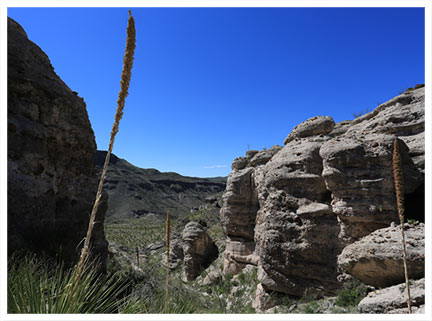
Arkansas Democrat-Gazette / RICK MCFARLAND
This is the steep and rocky trail that Rick McFarland and Cathy Frye followed down into Fresno Canyon. Frye slipped and fell several times during their descent.


fter watching the sunrise, Rick and I ate a couple bowls of cereal. Then we each chugged several bottles of water, as we always do before a long hike.
If we’d followed our usual preparations, we also would have stopped at the ranger station to tell personnel there of our plans; then, if we didn’t return, they would realize we were in trouble.
But for the first time ever, we didn’t make that stop. We only casually mentioned our plans to a park employee we bumped into.
We didn’t bother to leave the usual note on our truck’s windshield with an outline of our hike’s path and when we expected to return.
Worst of all, we failed to pack emergency items. We carried no flashlight, space blankets or matches.
At 10:15 a.m., Rick and I pulled into the parking area for the Puerta Chilicote trailhead.
We opened our cooler and pulled out eight bottles of water — four for each of us. I stuffed several granola bars and a couple of bananas into my fanny pack. As always, Rick wore a knife at his waist and a Canon 5D over his shoulder. I packed the map we’d received at the ranger station, sunblock and Chapstick. My smartphone was dead, so we took Rick’s, not bothering to check the battery level.
We walked a mile down a dirt road to the trailhead and discovered a second parking area — not shown on our tiny map.
The brochures I’d read the night before said the trails were well marked by stacks of rocks, or cairns, and that hikers should be able to see two of them at any point along the way.
The West Rim Trail was pleasant and easy to follow. Bees buzzed around large patches of yellow flowers. Pink blooms dotted the desert floor.
This might become my new favorite trail, I thought.
When we reached the West Rim, Rick took a few photos and pulled out the map. The ranch ruins appeared to be close by.
We began the descent into Fresno Canyon. The trail turned steep and rocky. Each step required me to plant my wooden hiking stick in front of me to brace myself. I skidded and slid, cussing all the way down. Having undergone shoulder surgery earlier in the year, I worried about falling and re-injuring myself.
The heat drained our energy. Drops of sweat rolled down my forehead, stinging my eyes.
At the bottom of the canyon, Rick and I followed a Jeep trail alongside the dry bed of Fresno Creek. At one point, a second creek bed intersected it. We weren’t sure whether to stay on the Fresno creek bed to the left or follow the branch to the right.
We tried the right side first. No signs or cairns indicated where the ranch might be. “I need a break from this sun,” I told Rick, taking off my hat and wiping my forehead.

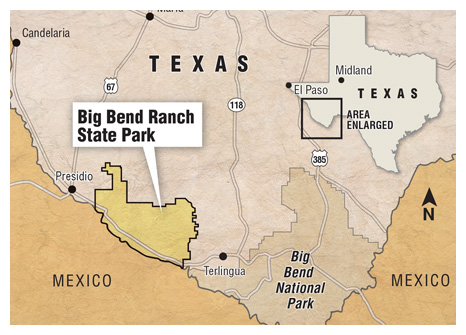


hile I sat on a rock, Rick scouted ahead. He returned minutes later and said, “I think we need to go the other way.”
We did so and found the ranch. A Jeep with Canada plates was parked out front.
We walked about 100 yards toward the ranch, then stopped, still exhausted from the steep descent into the canyon.
“Let’s go back to the Jeep,” I said.
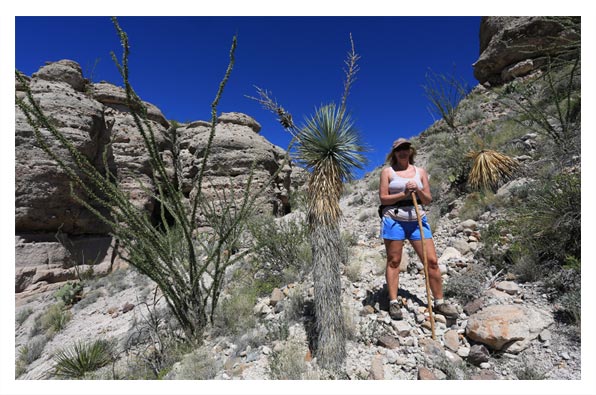
Special to the Arkansas Democrat-Gazette/RICK MCFARLAND
Rick McFarland shot this photo of his wife, Cathy Frye, as they began their decent into Fresno Canyon at Big Bend Ranch State Park.



e walked back to the vehicle and collapsed in its shade. We’d each guzzled three bottles of water already. I crammed the crunched-up empties into my fanny pack. Then we drank deeply from our aluminum containers.
“I think we should wait for these people to come back and ask for a ride,” I said.
“We don’t know how long that will be,” Rick countered. “What if they’re backpacking and spending the night somewhere?” He stood up and looked inside the Jeep. No supplies. No water. No way to tell whether the owners were returning anytime soon.
“I don’t think I can climb back up what we just came down,” I replied. “And we’re running out of water.”
I listened for voices. Maybe the Jeep’s occupants were just touring the ranch.
“Hello!” Rick and I yelled several times.
Nothing.
It was nearly 1:30 p.m. We were nearing the hottest part of the afternoon. It had taken us a long time to make the descent into the canyon. Going up would take longer. We might run out of daylight before getting back to the trailhead.
The relief I’d felt since we spotted the Jeep evaporated.
We are in trouble.

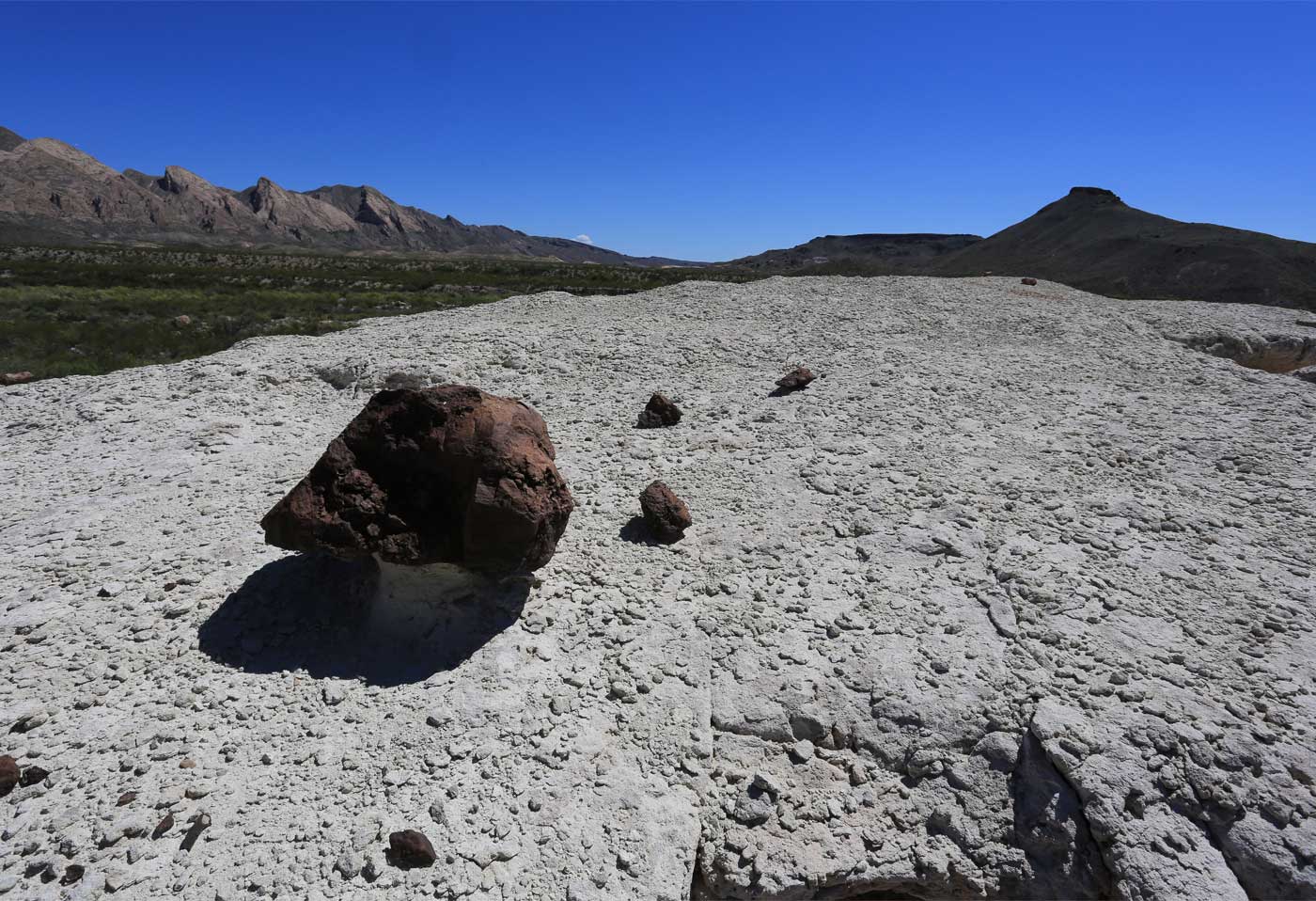
Arkansas Democrat-Gazette/RICK McFARLAND
Rick and Cathy crossed rough and rocky terrain for much of the first day of their hike in Big Bend Ranch State Park.


ick studied our 2-by-3 foot map. The portion that depicted our trail was the size of a quarter.
"It looks like we've made it almost halfway around the loop," he said. "We could just keep going."
"OK," I sighed.
We continued following the stream bed, searching for the next leg of the trail. "Look," Rick said. He pointed to a ribbon tied to a mesquite tree. "Someone put that there for a reason. I bet that's the trail we need."
We hiked up a steep incline, panting as we sought traction on the rocky slope. "Wow," Rick said, stopping short. "Look how far up we've climbed."
I turned to look back. If I'd made it up that hill, surely I could have managed the one we'd come down earlier.
Maybe we should have backtracked after all.
But the sight of a cairn reassured me. We were indeed on the trail.
Over the next several hours, we stopped often to rest. "I want my granola bar," Rick said during one break.
I reached behind me. "Oh no!" I'd left the fanny pack at the last stop.
We continued hiking. The sun beat down unmercifully. My calves burned. My breath came in gasps.
Focus. Just keep going.

ut every time I hit my groove, we had to stop. The cairns kept disappearing, obscured by desert vegetation.
Backtracking and searching for cairns burned up time and energy. It also required us to forge our own paths through the cactus. Needles tore at our skin. Vultures started to follow us. Each time we sat down, they circled.
Finally, Rick stopped abruptly. There was a sign. We'd found the Mexicano Falls trailhead. We were heading the right way.
Thank you, God.
There were no cars or people at the trailhead. It was 7 p.m., almost sunset, and we had only a couple of swallows of water left. The fading daylight, lack of water and the circling vultures quickened my pace.
But as I charged forward, Rick grew increasingly tired. The heat had finally caught up with him. He lagged behind, which worried me. Normally, I'm the one trying to keep up with his long strides.
By now, we'd emptied the water bottles. Even so, we frequently sprawled on our backs and turned the bottles up and shook them. Sometimes we were rewarded with a lingering drop or two. We licked the lids. We stuck our tongues inside the bottles and licked the interiors.
The cairns soon became more reliable, and the temperature began dropping. But just as I started to feel optimistic we reached a dead end and the edge of a canyon.
We looked at each other in disbelief.
"Oh my God," I said.


plopped down on the dirt and rocks, stunned. Rick sat down, too.
It was a little after 8 p.m.. We'd hiked a strenuous 9 1/2 miles and gotten nowhere.
"Help!" Rick yelled, startling me. "Help!"
I joined him. "Help! We're lost! We need water!"
There was no answer but our own voices echoing off the canyon walls.
We sat in silence for several minuets.
Rick took out his phone. No signal. Still, we tried to send a text to our close friend and fellow journalist Staton Breidenthal. It took several tries for my shaking fingers to type just one word: Help.
The message didn't go through. The phone did, however provide enough light to scan the overlook for a place to sleep.
"Not too close to the edge," I warned.
Rick worried about wildlife. Mountain lions. Snakes. Scorpions.
He found a relatively open area, and we laid down tentatively on a rocky patch of ground.
"It's going to get cold," Rick said. We'd endured hours under the scorching sun. My mouth felt gritty. I'd never been this thirsty. I couldn't conceive of being cold.
I wore shorts, a tank top and hiking shoes. Rick wore shorts, a Dri-Fit long-sleeved shirt and hiking boots. We entwined our legs and lay chest to chest to share body heat.
Above us, stars glittered. I tried to focus on the Milky Way.
A star fell. And then another.
I thought of the little match girl, and closed my eyes.

